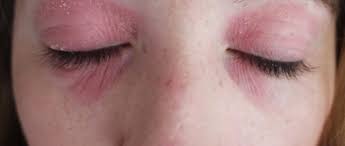Eczema, especially when it affects the sensitive skin around the eyes, can be challenging to manage. However, there are several effective treatment options available to help alleviate its symptoms and improve the overall health of your skin.
1. Topical Corticosteroids:
Topical corticosteroid creams or ointments triamcinolone acetonide (Kenalog) or fluticasone (Cutivate) are commonly prescribed by dermatologists to reduce inflammation and itching associated with eczema. When using these medications around the eyes, it’s essential to follow your healthcare provider’s instructions carefully, as prolonged use or excessive amounts can lead to thinning of the skin.
2. Topical Calcineurin Inhibitors:
Non-steroidal creams like tacrolimus (Protopic) and pimecrolimus (Elidel) can be used as an alternative to corticosteroids, especially in sensitive areas like the eyes. They work by suppressing the immune response that causes eczema and can be particularly effective for managing symptoms in this delicate region.
3. Emollients and Moisturizers:
Keeping the skin around your eyes well-hydrated is crucial in managing eczema. Use fragrance-free and hypoallergenic emollients or moisturizers (Vaseline) to lock in moisture and create a protective barrier against irritants.
4. Cold Compresses:
Applying cold compresses to the affected area can provide relief from itching and reduce inflammation. To do this, soak a clean cloth in cold water, wring it out, and apply it gently to the eyes for a few minutes.
5. Avoid Allergens and Irritants:
Identifying and eliminating triggers that exacerbate your eczema symptoms is paramount. This may include avoiding specific makeup products, skincare ingredients, or allergens like pollen and dust.
6. Prescription Medications:
In cases of severe eczema around the eyes, your dermatologist may prescribe oral corticosteroids or other systemic medications to control inflammation and itching. These should only be used under the supervision of a healthcare professional due to potential side effects.
7. Proper Skincare:
Adopt a gentle skincare routine, using mild, fragrance-free cleansers, and avoiding harsh scrubs or exfoliants. Always remove makeup before bedtime to prevent further irritation.
8. Manage Stress:
Stress can exacerbate eczema symptoms, so consider practicing stress-reduction techniques like meditation, yoga, or deep breathing exercises to help manage your condition.
9. Dietary Changes:
In some cases, dietary factors may contribute to eczema flare-ups. Consult with a healthcare provider or allergist to determine if certain foods are triggering your symptoms.
10. Consult a Dermatologist:
If eczema around your eyes persists or worsens despite self-care efforts, it’s essential to seek professional help. A dermatologist can provide a tailored treatment plan and recommend appropriate medications to effectively manage your eczema.
Eczema Eyelid Cream
These creams are designed to soothe itching, reduce inflammation, and keep the skin around your eyes moisturized. If you’re struggling with eczema around your eyelids, consider incorporating an eczema eyelid cream (Flexitol Face & Eyelid Eczema Cream) into your skincare routine to help manage your symptoms and promote healthier, more comfortable skin.
Topical corticosteroid creams or ointments such as triamcinolone acetonide (Kenalog) or fluticasone (Cutivate) are also commonly prescribed by dermatologists to reduce inflammation and itching associated with eczema.
In conclusion, effective treatment for eczema around the eyes involves a combination of topical treatments, proper skincare, and lifestyle adjustments. By working closely with a healthcare provider and following a personalized treatment plan, individuals with eczema can find relief and improve the overall health of their skin. Remember that managing eczema is an ongoing process, and consistency in your skincare routine and treatment plan is essential to keeping symptoms under control.

